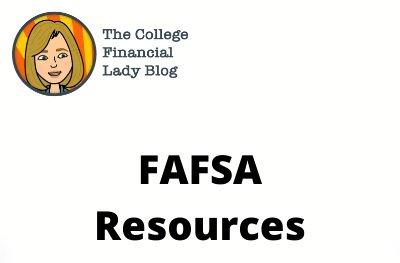
Featured
The new Simplified FAFSA is here! Here’s a quick video with some tips that will help you get through it with a minimum of chaos and maximum of financial aid. 🔗
Most recent posts
Work study falls under the self-help column of financial aid. If your aid award includes work-study, you should understand what it is.
Yes, your household expenses will change when your student goes away to school. But be careful making assumptions about how much extra money you’ll have available to pay for college.
It’s tax time, which means it’s time to claim education tax credits you may be eligible for. Unfortunately, a lot of tax software programs don’t provide good instructions for doing so. Here’s what you need to know.
A lot of financial advisors tell clients not to use 529s for college savings. If that’s what yours says, you might ask whether they’re acting in your best interest.
Form 1098-T is a tuition statement that students receive from their college. Form 1098-T isn't filed with your taxes; instead, you use the information to file and then keep it for your records.
Highlights
Happy 2026! Last year I made a New Year’s Resolution and kept it. That makes me a self-appointed expert on New Year’s resolutions. Here are some resolutions for parents planning for college— and my expert advice on how to keep your resolutions.
Filing the FAFSA and CSS Profile raises tons of questions for divorced parents. Here are some answers.
We’re almost there: acceptance letters are arriving and the May 1 decision day is right around the corner. For most families, how much schools cost is part of the decision making process.
What is and isn’t an asset on the FAFSA? Here’s a quick “is it or isn’t it?” for you.
Parent assets seem to be the area that most families and planners focus on, despite the fact that they typically have the smallest impact on the formula of each of the components. Strategies and tactics to minimize parent assets abound, but for most families these result more in nibbling around the edges than actually making a significant dent in SAI.
The College Board’s annual Trends in College Pricing and Student Aid report was released recently. Among the headline findings: college tuition prices increased at extremely low rates for the second year in a row, reflecting both a combination of continued impacts of the pandemic and enrollment pressures from demographic trends.
Happy FAFSA Day! Are you completing the FAFSA for the first time this year? While you’re waiting for the site to load, here are some resources that will help you get through it with a minimum of chaos and maximum of financial aid.
I think Oregon is one of the last places in the US that starts school after Labor Day so my apologies if you’re no longer in back-to-school mode. Here are some resolutions your family might make for the coming school year. And, here’s hoping they don’t get broken as quickly as the typical New Year’s diet-and-exercise resolutions!
Categories
The FAFSA & CSS Profile
Saving for College
Student Loans
Application Process
Miscellaneous
All blog posts
Financial Aid Basics
There’s a ton of talk about the FAFSA right now, which on the one hand makes sense because it will be available next week. (Yes, all evidence to the contrary, time does continue marching forward with the result that Oct. 1 arrives next week.)
Aid Formulas
Refresher post on the three aid formulas: 1. Federal methodology (FM), based on the FAFSA; 2. Institutional Methodology (IM), based on the CSS PROFILE; and 3. Consensus Methodology (CM), which uses both aid forms. Each aid formula has a different way of calculating a family’s financial strength with respect to ability to pay for college.
Why Upperclassmen Lose Financial Aid
Link to an insightful NY Times article.
Financial Aid Offers
A three pronged strategy to review financial aid offers by a college counselor Julia Surtshin to ensure you make an informed evaluation of offers.
Where does financial aid come from?
I know, I’ve been harping on the FAFSA lately. (Did you fill it out yet? If not, go here to do so.) For those who still have some time before applying to schools, let’s switch gears and talk about where aid comes from.
Funded and Unfunded Aid
Congratulations! You got accepted into several schools, and each offered you some financial aid. When you compare the offers, it’s important to make apples-to-apples comparisons. The first thing to figure out is, did you get funded aid or unfunded aid?









I Bonds aren’t paying 9% any more, but using them to pay for college can make up for that.